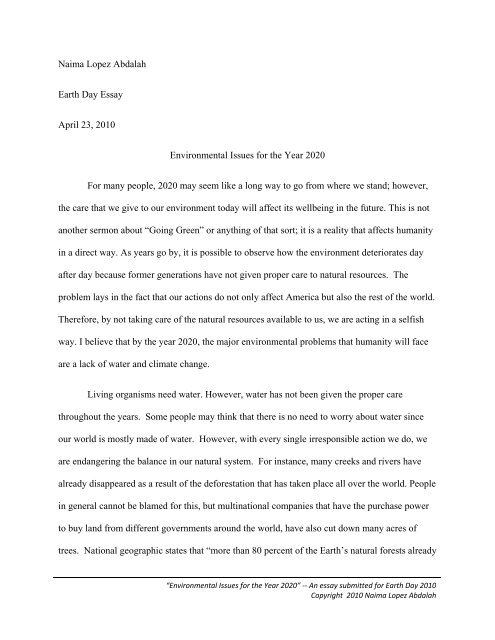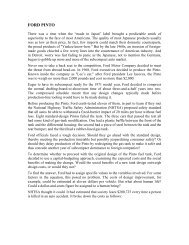Environmental Issues for the Year 2020
Environmental Issues for the Year 2020
Environmental Issues for the Year 2020
Create successful ePaper yourself
Turn your PDF publications into a flip-book with our unique Google optimized e-Paper software.
Naima Lopez Abdalah<br />
Earth Day Essay<br />
April 23, 2010<br />
<strong>Environmental</strong> <strong>Issues</strong> <strong>for</strong> <strong>the</strong> <strong>Year</strong> <strong>2020</strong><br />
For many people, <strong>2020</strong> may seem like a long way to go from where we stand; however,<br />
<strong>the</strong> care that we give to our environment today will affect its wellbeing in <strong>the</strong> future. This is not<br />
ano<strong>the</strong>r sermon about “Going Green” or anything of that sort; it is a reality that affects humanity<br />
in a direct way. As years go by, it is possible to observe how <strong>the</strong> environment deteriorates day<br />
after day because <strong>for</strong>mer generations have not given proper care to natural resources. The<br />
problem lays in <strong>the</strong> fact that our actions do not only affect America but also <strong>the</strong> rest of <strong>the</strong> world.<br />
There<strong>for</strong>e, by not taking care of <strong>the</strong> natural resources available to us, we are acting in a selfish<br />
way. I believe that by <strong>the</strong> year <strong>2020</strong>, <strong>the</strong> major environmental problems that humanity will face<br />
are a lack of water and climate change.<br />
Living organisms need water. However, water has not been given <strong>the</strong> proper care<br />
throughout <strong>the</strong> years. Some people may think that <strong>the</strong>re is no need to worry about water since<br />
our world is mostly made of water. However, with every single irresponsible action we do, we<br />
are endangering <strong>the</strong> balance in our natural system. For instance, many creeks and rivers have<br />
already disappeared as a result of <strong>the</strong> de<strong>for</strong>estation that has taken place all over <strong>the</strong> world. People<br />
in general cannot be blamed <strong>for</strong> this, but multinational companies that have <strong>the</strong> purchase power<br />
to buy land from different governments around <strong>the</strong> world, have also cut down many acres of<br />
trees. National geographic states that “more than 80 percent of <strong>the</strong> Earth’s natural <strong>for</strong>ests already<br />
“<strong>Environmental</strong> <strong>Issues</strong> <strong>for</strong> <strong>the</strong> <strong>Year</strong> <strong>2020</strong>” ‐‐ An essay submitted <strong>for</strong> Earth Day 2010<br />
Copyright 2010 Naima Lopez Abdalah
have been destroyed” (1). National Geographic also explains that <strong>the</strong> rain<strong>for</strong>ests help produce<br />
rainfall; hence, by cutting down trees many countries like Nigeria and Ghana have experienced<br />
decades of droughts and, consequently decades of hunger (National Geographic 1). Here, it is<br />
possible to observe how <strong>the</strong> action of cutting down trees generates a chain of bad events. This is<br />
<strong>the</strong> year 2010 and 80% of <strong>the</strong> <strong>for</strong>ests are already gone. By <strong>the</strong> year <strong>2020</strong>, most of <strong>the</strong> <strong>for</strong>ests will<br />
be gone and with <strong>the</strong>m many rivers, lakes, lagoons, ponds, etc. Ano<strong>the</strong>r example can be found in<br />
Central America. The Central American countries are rich in natural resources; however, as a<br />
result of a poor political administration, many multinational and national companies have<br />
de<strong>for</strong>ested large areas of land. Nicaragua is a Central American country that is rich in water<br />
resources; however, most of <strong>the</strong>m have been contaminated. Nicaragua possesses a lake that could<br />
supply Central America with water in <strong>the</strong> future; never<strong>the</strong>less, national companies that pour out<br />
<strong>the</strong>ir byproducts to <strong>the</strong> rivers that are connected to <strong>the</strong> lake have contaminated those rivers and<br />
<strong>the</strong> lake. Besides that, people do not have a strong sense of responsibility towards nature and do<br />
not deposit <strong>the</strong>ir garbage in trash cans, contaminating <strong>the</strong> lake that provides <strong>the</strong> vital source.<br />
<strong>Environmental</strong> issues are strongly linked to <strong>the</strong> economy of <strong>the</strong> world. Why Because<br />
since water is one of <strong>the</strong> most important natural resources, big corporations have looked into<br />
privatizing <strong>the</strong> potable water system. Privatization of water has already started to take place in<br />
many states. European corporations have already bought many American water supply<br />
companies. In 2000, <strong>the</strong> largest water company in <strong>the</strong> world, Suez, bought <strong>the</strong> American water<br />
company United Water Resources. Also, in 2003, a German corporation bought American Water<br />
Works (U.S SERC 1). If inflation rates go up year after year and if <strong>the</strong> privatization monster<br />
appropriates more American ground, by <strong>2020</strong>, many low income families will not be able to<br />
“<strong>Environmental</strong> <strong>Issues</strong> <strong>for</strong> <strong>the</strong> <strong>Year</strong> <strong>2020</strong>” ‐‐ An essay submitted <strong>for</strong> Earth Day 2010<br />
Copyright 2010 Naima Lopez Abdalah
purchase water at all. The contamination of <strong>the</strong> water plus <strong>the</strong> privatization will be a great<br />
problem by <strong>2020</strong>. Un<strong>for</strong>tunately, water is not <strong>the</strong> only environmental problem that we will face<br />
in <strong>the</strong> year <strong>2020</strong>.<br />
Global warming has been affecting our world. As <strong>the</strong> result of global warming, <strong>the</strong> world<br />
is experiencing drastic climate changes. Through <strong>the</strong> news we have witnessed <strong>the</strong> meltdown of<br />
<strong>the</strong> poles, eruptions of volcanoes, hurricanes and various o<strong>the</strong>r natural disasters. I believe that by<br />
<strong>2020</strong>, global warming will be <strong>the</strong> cause of a great part of environmental problems. Climate<br />
changes have been drastic especially in 2010. A great example of climate change is <strong>the</strong> late<br />
winter snow that Arkansas and o<strong>the</strong>r states experienced this year. At <strong>the</strong> same time, <strong>the</strong> rest of<br />
<strong>the</strong> world is also being affected by <strong>the</strong> drastic climate change. In some countries, <strong>the</strong> temperature<br />
has risen to degrees never seen be<strong>for</strong>e. In an article from <strong>the</strong> United Nations Environment<br />
Programme (UNEP), it is stated that <strong>the</strong> velocity and impact to which <strong>the</strong> climate change is<br />
taking place is incredibly fast. Climate change is even affecting <strong>the</strong> levels of acidification in <strong>the</strong><br />
ocean. This means that now we have water that corrodes <strong>the</strong> shells in <strong>the</strong> ocean (UNEP 1). What<br />
kind of water are we going to have by <strong>2020</strong> Are we going to have water that kills <strong>the</strong> human<br />
cells Questions like <strong>the</strong>se ones are terrifying. The United States <strong>Environmental</strong> Protection<br />
Agency (EPA) states that <strong>the</strong> acidification of ocean water is a result of <strong>the</strong> carbon dioxide<br />
released from human activities (1). Also <strong>the</strong> UNEP states that <strong>the</strong> degree of <strong>the</strong> meltdown of <strong>the</strong><br />
glaciers is 60% faster than it was in 1998 (1). The levels of <strong>the</strong> ocean are going to increase if <strong>the</strong><br />
pace of meltdown stays <strong>the</strong> same. With this happening, many islands that have a low level<br />
compared to <strong>the</strong> ocean are going to lose part of <strong>the</strong>ir land. UNEP also declared that <strong>the</strong> ocean<br />
levels could rise up to two meters by <strong>the</strong> year 2100, and <strong>the</strong>y also asserted that because of<br />
“<strong>Environmental</strong> <strong>Issues</strong> <strong>for</strong> <strong>the</strong> <strong>Year</strong> <strong>2020</strong>” ‐‐ An essay submitted <strong>for</strong> Earth Day 2010<br />
Copyright 2010 Naima Lopez Abdalah
climate change, many ecosystems and species have gone into extinction (1).The human hand has<br />
also contributed to <strong>the</strong> rise of <strong>the</strong> ocean level. Factors such as “pumping of ground water <strong>for</strong><br />
human use, impoundment in reservoirs, wetland drainage, [and] de<strong>for</strong>estation” have contributed<br />
to this phenomenon (EPA 1). The consequences of this extreme climate change will be felt by<br />
everybody by <strong>2020</strong>. For instance, many people might die because of <strong>the</strong> high temperatures;<br />
agriculture may suffer; drinking water resources might be scarce; and many animals might die,<br />
etc. In o<strong>the</strong>r words, our world is going through severe changes that may cause our Earth to<br />
disappear at some point. All of <strong>the</strong> damage, such as <strong>the</strong> emission of carbon dioxide that <strong>the</strong> Earth<br />
has faced throughout <strong>the</strong> years, is finally showing its consequences. The lack of water and<br />
climate change are strongly related, and both factors, along with many o<strong>the</strong>rs, will destroy <strong>the</strong><br />
balance of <strong>the</strong> Earth.<br />
It might seem too late to start saving our planet, but I think we still have a little hope. The<br />
contamination of water will surely be a problem by <strong>the</strong> year <strong>2020</strong>, but it is possible to take some<br />
measures to decrease <strong>the</strong> velocity to which this phenomenon is happening. First of all, it is<br />
necessary to show people <strong>the</strong> environmental and economic consequences that abuse of hydro<br />
resources will bring to our planet and, hence, to us. This can be done through campaigns that<br />
make people aware of this situation. Also, this can be done through concerts that capture <strong>the</strong><br />
attention of young people. Additionally, when it comes to multinational companies endangering<br />
<strong>the</strong> wellbeing of <strong>the</strong> nature, it is necessary to take stronger measures such as organizing protests<br />
and getting involved with organizations that work <strong>for</strong> <strong>the</strong> protection of <strong>the</strong> environment. It may<br />
sound as a cliché, but we can also help by depositing <strong>the</strong> trash where it is supposed to go. Also,<br />
we can help our environment by recycling.<br />
“<strong>Environmental</strong> <strong>Issues</strong> <strong>for</strong> <strong>the</strong> <strong>Year</strong> <strong>2020</strong>” ‐‐ An essay submitted <strong>for</strong> Earth Day 2010<br />
Copyright 2010 Naima Lopez Abdalah
When it comes to <strong>the</strong> problem of climate change, many organizations have said that<br />
trying to control this phenomenon may incur great expenses. One of <strong>the</strong> solutions that<br />
environmental econonomists have seen is to reduce <strong>the</strong> use of coal. Paul Krugman from The New<br />
York Magazine declares that according to environmental economists, trying to cut down on <strong>the</strong><br />
green house gases, such as carbon dioxide from cars, might have a moderate cost (Krugman 1).<br />
Many economists also state that pollution “should be treated as a crime” (Krugman 1). This<br />
might seem like an extreme measure; however, extremes situations like this one require extreme<br />
solutions. In a personal basis, <strong>the</strong>re are many simple courses of action that can be taken. The<br />
EPA advises individuals to change energy appliances to Energy Star products, use green power,<br />
recycle, use water in a wise way, and help <strong>the</strong> environment through spreading <strong>the</strong> word about<br />
protecting natural resources (1).<br />
When I picture myself in <strong>the</strong> year <strong>2020</strong>, I try to think in a positive way. In ten years from<br />
now, I will be 28 years old. By that time, I will probably have a master’s degree in Management,<br />
and I might own my own house. Sadly, I will be affected by all <strong>the</strong> environmental issues.<br />
Especially, <strong>the</strong> privatization of water especially worries me because at some point, <strong>the</strong> price of<br />
water service will be too expensive. I also think about all <strong>the</strong> poor people and third world<br />
countries whose economy will be hit by privatization. It does not seem like a fair situation. And<br />
that is why it is necessary to start thinking about <strong>the</strong> rest of <strong>the</strong> world. Personally, I would also be<br />
affected by <strong>the</strong> climate change because I cannot live in a hot climate because my skin gets<br />
allergies due to high temperatures. Also, in my family, <strong>the</strong>re have been high blood pressure<br />
problems, and I am afraid that I might have <strong>the</strong> same problems in <strong>the</strong> future, especially if <strong>the</strong><br />
temperature of <strong>the</strong> Earth increases.<br />
“<strong>Environmental</strong> <strong>Issues</strong> <strong>for</strong> <strong>the</strong> <strong>Year</strong> <strong>2020</strong>” ‐‐ An essay submitted <strong>for</strong> Earth Day 2010<br />
Copyright 2010 Naima Lopez Abdalah
It is important to develop a socially responsible attitude towards our planet. Our planet is<br />
already suffering <strong>the</strong> damage produced by previous deliberate actions; hence, we as human<br />
beings suffer <strong>the</strong> consequences, too. It is up to each individual to make <strong>the</strong> decision of saving <strong>the</strong><br />
planet. It is a big commitment, but it is worth it. As people who live in Arkansas, we should<br />
especially preserve <strong>the</strong> natural state. We should treat our planet as it should be treated. God<br />
created this world so beautiful, and he placed men and women in it so that <strong>the</strong>y can take good<br />
care of it. It is our responsibility to love our planet and as Marya Mannes, American author, said,<br />
“The earth we abuse and <strong>the</strong> living things we kill will, in <strong>the</strong> end, take <strong>the</strong>ir revenge; <strong>for</strong> in<br />
exploiting <strong>the</strong>ir presence we are diminishing our future” (qtd. in Quote Garden 1).<br />
“<strong>Environmental</strong> <strong>Issues</strong> <strong>for</strong> <strong>the</strong> <strong>Year</strong> <strong>2020</strong>” ‐‐ An essay submitted <strong>for</strong> Earth Day 2010<br />
Copyright 2010 Naima Lopez Abdalah
Works Cited<br />
National Geographic. “Forest Holocaust.” National Geographic. 2010. Web. 18 Apr. 2010.<br />
.<br />
State <strong>Environmental</strong> Resource Center. “Water Privatization: Policy <strong>Issues</strong> Package.” SERC. 25<br />
Sept. 2004. Web. 18 Apr. 2010.<br />
.<br />
Krugman, Paul. “Building a Green Economy.” The New York Times. 5 Apr. 2010. Web. 17 Apr.<br />
2010. .<br />
Quote Garden. “Quotations about <strong>the</strong> Environment”. The Quote Garden. 2010. Web. 20 Apr.<br />
2010. .<br />
U.S <strong>Environmental</strong> Protection Agency. “Recent Ocean Acidification” EPA. 29 Jan. 2010. Web.<br />
17 Apr. 2010. .<br />
---. “Sea Level Changes”. EPA. 05 Nov. 2009. Web. 17 Apr. 2010.<br />
.<br />
“<strong>Environmental</strong> <strong>Issues</strong> <strong>for</strong> <strong>the</strong> <strong>Year</strong> <strong>2020</strong>” ‐‐ An essay submitted <strong>for</strong> Earth Day 2010<br />
Copyright 2010 Naima Lopez Abdalah
















